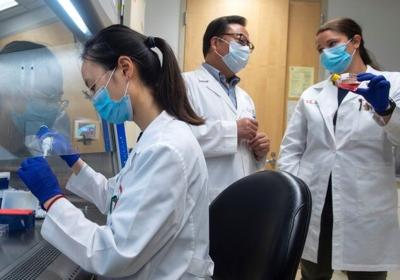LOUISVILLE, Ky. (WDRB) -- The University of Louisville is getting $6.1 million in grant funding for researchers to investigate immune system dysregulation "responsible for acute respiratory distress, the condition responsible for serious illness and death in some COVID-19 patients," and how to prevent it.
In a news release, the university said three grants will help researchers expand their work. Two grants, from the National Institutes of Health (NIH), total $5.8 million. A separate $306,000 from the NIH Small Business Innovation Research grant brings the funding to $6.1 million.
The grants will help fund early testing of DGN-23, a compound already developed at UofL as a possible treatment, as well as continue research into the immune systems' response.
During the pandemic, UofL health providers treated COVID-19 patients who developed a severe lung disease called acute respiratory distress syndrome (ARDS) due to cytokine storm, an extreme over-response of the immune system. Those physicians and providers shared opinions, data and samples with UofL researchers in hopes of discovering the cause of the immune system over-response.
“At one time we had over 100 patients with COVID in the hospital," Jiapeng Huang, anesthesiologist with UofL Health and professor and vice chair of the Department of Anesthesiology and Perioperative Medicine in the UofL School of Medicine, said in a news release. "Once they were on a ventilator, mortality was about 50%. We were looking at this issue to see why some people would do well while some developed bad lung disease and did not do well or died.”
UofL researchers, spearheaded by immunologist Jun Yun, discovered excessive high levels of a specific type of immune cells called low-density inflammatory neutrophils in COVID-19 patients. Their findings were published in JCI Insight in 2021. With the grants, Yun's team will be better equipped to find out why the immune system acts this way in COVID and develop treatments.
“Through this fruitful collaboration, we now have acquired NIH funding for basic and translational studies and even progress toward commercialization of a potential therapy,” Yan said. “That’s why we do this research – eventually we want to benefit the patients.”
To read more about the funding and the research, click here.
Copyright 2023 WDRB Media. All Rights Reserved.











